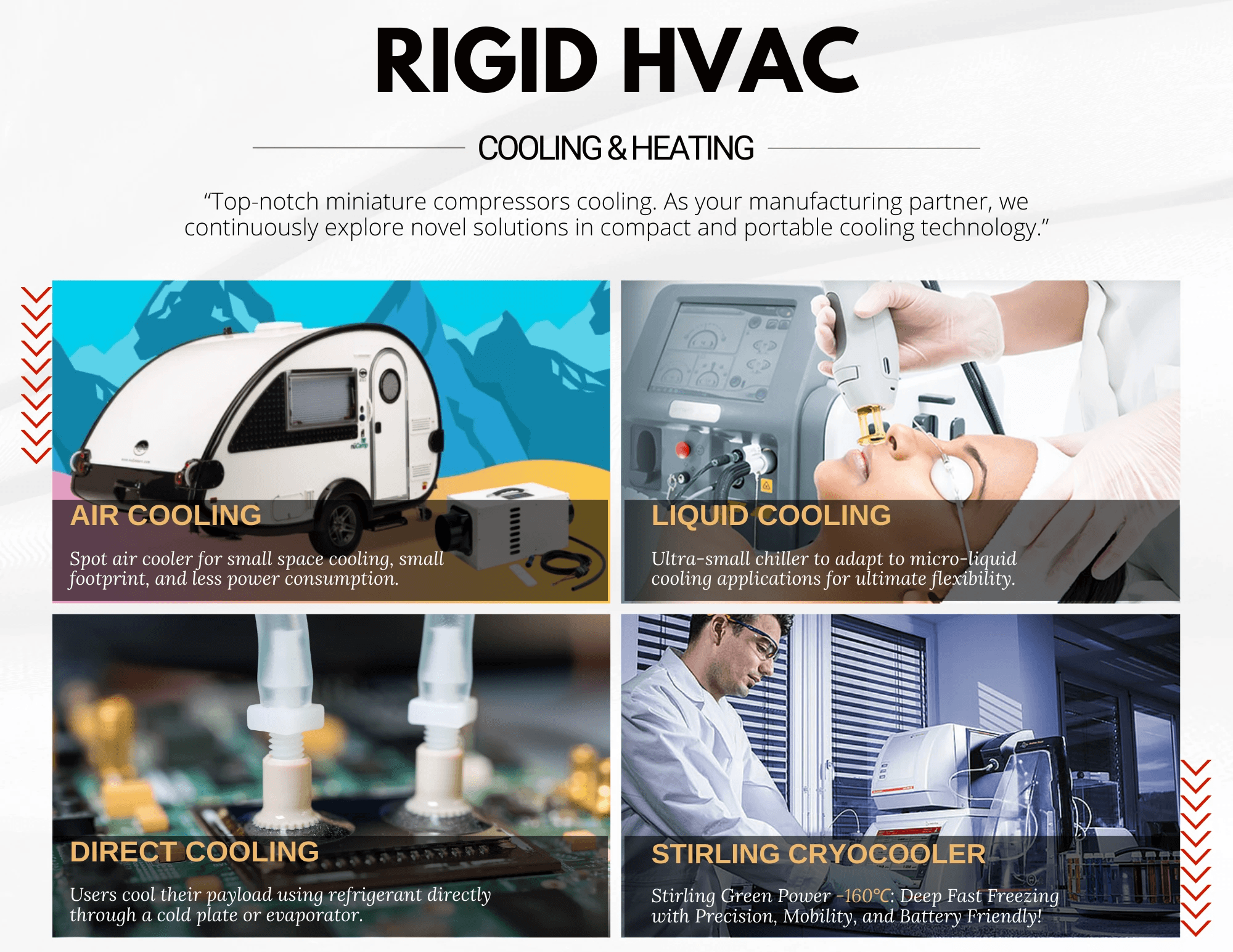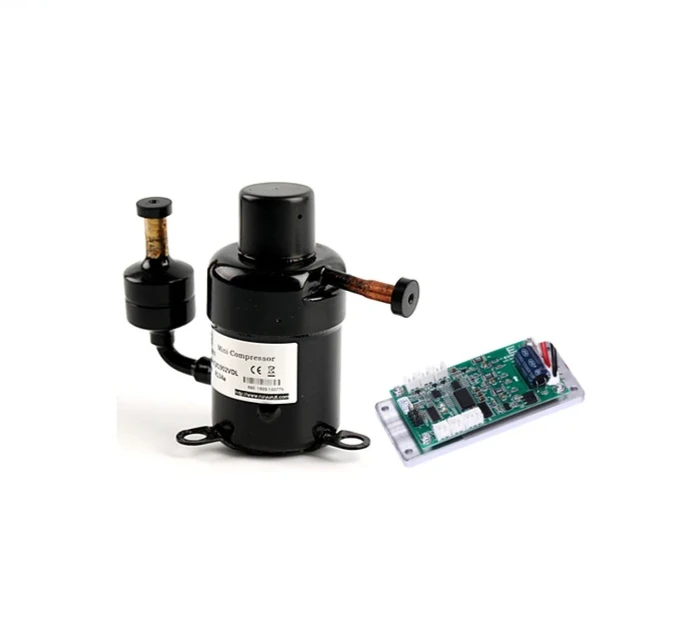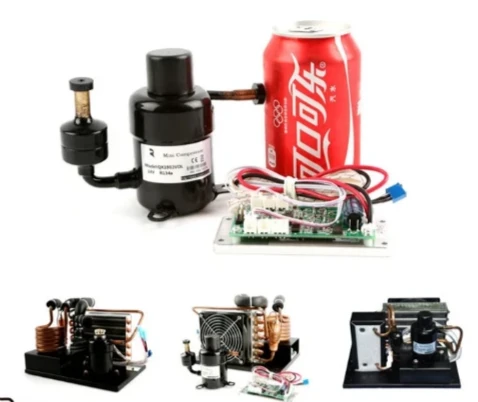Introduction

"RIGID is a miniature refrigerated compressor innovation leader in China. We keep looking for novel solutions in compact and portable cooling systems. We capture new technologies in mobile and compact cooling systems."
In the world of HVAC systems, the electronic expansion valve is a game-changer, revolutionizing how air conditioning units operate. By regulating refrigerant flow with precision, these valves enhance the performance of air conditioning compressors and indoor air cooling units alike. Understanding their role not only highlights their importance but also sheds light on why they are becoming the preferred choice in modern HVAC technology.
Understanding Electronic Expansion Valves
An electronic expansion valve (EEV) is an advanced device that optimizes refrigerant flow within HVAC systems. Unlike traditional mechanical valves that rely on fixed orifice sizes and pressure differentials, EEVs utilize electronic controls to adjust their opening based on real-time system demands. This adaptability allows for improved temperature regulation and energy efficiency, making them essential components in contemporary air conditioning units.
Role of Expansion Valves in HVAC Systems
Expansion valves play a crucial role in maintaining the balance between refrigerant flow and pressure within HVAC systems. They ensure that the right amount of refrigerant enters the evaporator coil, facilitating effective heat exchange and maintaining desired indoor temperatures. In doing so, these valves contribute significantly to the overall efficiency of air conditioning compressors and ensure optimal performance across various indoor air cooling units.
Benefits of Electronic Over Mechanical
The advantages of electronic expansion valves over their mechanical counterparts are numerous and compelling. First and foremost, EEVs offer enhanced precision in controlling refrigerant flow, leading to improved energy efficiency and lower operational costs for homeowners and businesses alike. Additionally, as HVAC technology continues to evolve, compatibility with modern air conditioning compressors makes electronic expansion valves an indispensable part of any efficient heating or cooling system.
What is an Electronic Expansion Valve?

In the realm of HVAC systems, the electronic expansion valve (EEV) plays a pivotal role in optimizing the performance of air conditioning units. Unlike traditional mechanical expansion valves, EEVs utilize electronic controls to regulate refrigerant flow with precision. This advancement allows for more efficient operation and improved comfort levels in indoor air cooling units.
Definition and Functionality
An electronic expansion valve is a sophisticated device designed to control the flow of refrigerant in HVAC systems, particularly in air conditioning units. It functions by adjusting the amount of refrigerant that enters the evaporator coil based on real-time temperature and pressure data from various sensors. This dynamic regulation ensures that the air conditioning compressor operates efficiently, maintaining optimal performance while enhancing energy savings.
The functionality of EEVs extends beyond simple flow control; they enable better responsiveness to changing cooling demands within indoor air cooling units. By continually adjusting refrigerant flow, these valves help maintain consistent temperatures, reducing fluctuations that can lead to discomfort or inefficient operation. In essence, they act as the brain behind effective temperature management in modern HVAC systems.
Key Components Explained
The main components of an electronic expansion valve include a stepper motor, sensors, and an electronic control unit (ECU). The stepper motor is responsible for precisely opening or closing the valve based on signals received from the ECU, which interprets data from temperature and pressure sensors placed throughout the system. This intricate communication allows for real-time adjustments to be made instantly.
Additionally, many EEVs come equipped with diagnostic capabilities that provide valuable insights into system performance and potential issues. This feature enhances maintenance efforts by allowing technicians to identify problems before they escalate into costly repairs or inefficiencies within air conditioning units. Thus, these key components work harmoniously to ensure optimal functionality within HVAC compressors.
Differences from Traditional Valves
When comparing electronic expansion valves to traditional mechanical valves, several key differences emerge that highlight why EEVs are becoming increasingly popular in modern HVAC applications. Traditional valves rely on fixed openings and operate based on varying pressures alone; this can lead to inefficiencies due to their inability to adapt quickly to changing conditions within indoor air cooling units.
In contrast, EEVs offer unparalleled flexibility by utilizing electronic controls that allow for instantaneous adjustments based on real-time data inputs from multiple sensors throughout the system. This capability not only improves efficiency but also enhances overall comfort levels by ensuring precise temperature regulation across different zones in a building's climate control system.
Moreover, while traditional valves may require manual adjustments or replacements over time due to wear and tear, electronic expansion valves often come with built-in diagnostics that facilitate proactive maintenance strategies—saving both time and money for operators managing HVAC compressors across various settings.
How Electronic Expansion Valves Operate

Understanding how electronic expansion valves operate is essential for grasping their role in modern HVAC systems. These valves are designed to precisely control the flow of refrigerant within air conditioning units, ensuring optimal performance and efficiency. By incorporating advanced technology, they significantly enhance the functionality of air conditioning compressors and indoor air cooling units.
Control Mechanisms and Sensors
At the heart of an electronic expansion valve is its sophisticated control mechanism, which utilizes various sensors to monitor system conditions in real-time. These sensors gauge parameters such as temperature and pressure, allowing the valve to make instantaneous adjustments based on current demands. This dynamic regulation ensures that the refrigerant flow is optimized for varying loads, enhancing the overall efficiency of air conditioning units.
Furthermore, these control mechanisms are often integrated with smart HVAC systems that can learn from usage patterns and environmental changes. This adaptability not only improves comfort levels but also reduces energy consumption by fine-tuning the operation of HVAC compressors as needed. With these advanced features, electronic expansion valves truly represent a leap forward from traditional mechanical options.
Refrigerant Flow Regulation
The primary function of an electronic expansion valve is to regulate refrigerant flow precisely, which directly impacts system performance in air conditioning units. Unlike mechanical valves that rely on fixed orifices and manual adjustments, electronic valves can modulate their opening based on real-time feedback from sensors. This capability allows for a more tailored approach to refrigerant distribution, providing just the right amount necessary for efficient cooling.
Moreover, this regulation helps maintain optimal pressure levels within the system, preventing issues like flooding or starvation that can hinder compressor performance in HVAC systems. By ensuring that each component operates within its ideal range, electronic expansion valves contribute significantly to extending the lifespan of both air conditioning compressors and indoor air cooling units alike. The result? Enhanced reliability and reduced operational costs over time.
Impact on Air Conditioning Units
The impact of electronic expansion valves on air conditioning units cannot be overstated; they fundamentally transform how these systems operate under various conditions. With their ability to adjust refrigerant flow dynamically, these valves improve responsiveness during temperature fluctuations—meaning your indoor environment remains comfortable no matter what Mother Nature throws at you!
Additionally, by optimizing refrigerant management within HVAC compressors, electronic expansion valves facilitate better energy use overall—leading to lower utility bills for consumers while promoting sustainability through reduced energy waste. As more manufacturers adopt this technology across their product lines for indoor air cooling units and beyond, we can expect significant advancements in both efficiency and user experience throughout the industry.
Advantages of Using Electronic Expansion Valves

When it comes to optimizing HVAC systems, electronic expansion valves (EEVs) are a game changer. These innovative components significantly enhance the efficiency and performance of air conditioning units, ensuring that they operate at peak levels. By intelligently regulating refrigerant flow, EEVs can adapt to varying conditions, making them a vital addition to modern HVAC technology.
Improved Efficiency and Performance
One of the standout benefits of electronic expansion valves is their ability to improve overall system efficiency. Unlike traditional mechanical valves, which can be limited in their responsiveness, EEVs utilize advanced control mechanisms that allow for precise adjustments in real-time. This means that air conditioning compressors can operate more effectively, leading to reduced energy consumption and lower utility bills for homeowners.
Moreover, improved efficiency translates into enhanced performance for indoor air cooling units. With optimized refrigerant flow regulation from the electronic expansion valve, these systems can maintain desired temperatures more consistently. The result? A comfortable indoor environment without the excessive energy costs typically associated with older technologies.
Enhanced Temperature Control
Temperature control is crucial for both comfort and energy savings in any HVAC system. Electronic expansion valves offer superior temperature management capabilities compared to their mechanical counterparts. By continuously monitoring and adjusting refrigerant flow based on real-time data from sensors, EEVs ensure that air conditioning units deliver precisely the right amount of cooling when needed.
This level of precision not only enhances comfort but also extends the lifespan of HVAC compressors by reducing strain during operation. As a result, homeowners can enjoy a stable indoor climate while minimizing wear and tear on critical components like the air conditioning compressor. In essence, enhanced temperature control contributes to a more reliable and efficient cooling experience.
Compatibility with Modern HVAC Compressors
Another significant advantage of electronic expansion valves is their compatibility with modern HVAC compressors designed for high-efficiency performance. As technology advances in heating and cooling solutions, EEVs seamlessly integrate into these systems without requiring extensive modifications or retrofitting efforts. This makes them an attractive option for both new installations and upgrades to existing setups.
Moreover, this compatibility ensures that air conditioning units equipped with electronic expansion valves can take full advantage of variable-speed compressors' capabilities—enhancing overall system responsiveness even further. The synergy between electronic expansion valves and modern compressors leads to smoother operation cycles while maximizing energy savings across various applications in residential or commercial settings.
The Role of Electronic Expansion Valves in Air Conditioning Units

In the realm of air conditioning units, electronic expansion valves (EEVs) play a pivotal role in enhancing overall system efficiency and performance. These advanced components seamlessly integrate with indoor air cooling units to ensure optimal refrigerant flow, which is crucial for maintaining desired temperature levels. By replacing traditional mechanical expansion valves with EEVs, HVAC systems can achieve a higher degree of precision in temperature control and energy savings.
Integration with Indoor Air Cooling Units
The integration of electronic expansion valves into indoor air cooling units marks a significant advancement in HVAC technology. Unlike their mechanical counterparts, EEVs can adjust refrigerant flow dynamically based on real-time data from sensors, allowing for more responsive cooling adjustments. This means that as the demand for cooling fluctuates, the electronic expansion valve can react almost instantaneously to optimize performance and maintain comfort.
Moreover, the compatibility of EEVs with modern air conditioning compressors enhances their functionality within the system. When paired with high-efficiency HVAC compressors, these valves help maximize energy use while minimizing waste. This synergy not only contributes to lower utility bills but also promotes longer equipment lifespan due to reduced strain on components.
Effects on System Responsiveness
One of the standout features of electronic expansion valves is their ability to significantly improve system responsiveness in air conditioning units. Traditional expansion valves often operate based on fixed settings that may not adapt well to changing conditions; however, EEVs utilize sophisticated control mechanisms that respond instantly to variations in temperature and pressure within the system. This leads to quicker adjustments in refrigerant flow, ensuring that indoor spaces reach desired temperatures faster.
The enhanced responsiveness afforded by electronic expansion valves translates into a more comfortable environment for occupants as well. With precise control over refrigerant distribution, users experience fewer temperature fluctuations and improved humidity management throughout their space. In essence, this level of responsiveness ensures that indoor air cooling units work smarter—not harder—resulting in both comfort and efficiency.
Case Studies on Performance Improvement
Numerous case studies highlight the transformative impact that electronic expansion valves have had on air conditioning unit performance across various applications. For instance, one commercial building retrofitted its aging HVAC system with EEVs and reported an impressive 30% reduction in energy consumption within just months of installation. The integration allowed for better modulation of refrigerant flow during peak load times, optimizing overall efficiency without sacrificing comfort levels.
Another notable example comes from a residential setting where homeowners experienced substantial improvements after switching from mechanical expansion valves to electronic ones in their air conditioning systems. They enjoyed consistent temperatures throughout their home while also noticing a decrease in monthly energy bills—proof positive that investing in technology like EEVs pays off over time.
In summary, these case studies underscore how integrating electronic expansion valves into existing systems can lead to remarkable enhancements across both commercial and residential sectors alike—proving once again why they are becoming indispensable components within modern HVAC solutions.
RIGID Innovations in Electronic Expansion Valves

RIGID has taken the concept of electronic expansion valves to new heights, especially with their innovative solutions tailored for modern HVAC systems. By focusing on mini compressor solutions and customized applications, RIGID is addressing the ever-evolving needs of air conditioning units. Their commitment to enhancing performance and efficiency sets them apart in a competitive market.
Mini Compressor Solutions
RIGID’s mini compressor solutions have revolutionized how electronic expansion valves function within air conditioning units. These compact compressors are designed to work seamlessly with electronic expansion valves, optimizing refrigerant flow and improving overall system efficiency. By reducing the physical footprint while maintaining high performance, these innovations cater to both residential and commercial HVAC applications.
The integration of mini compressors allows for more precise control over the refrigerant cycle, enhancing the responsiveness of air conditioning units. This means that indoor air cooling units can maintain desired temperatures more effectively, leading to increased comfort for occupants. Ultimately, RIGID’s advancements in mini compressor technology showcase their dedication to pushing boundaries in HVAC compressors.
Customized Applications
Recognizing that one size does not fit all, RIGID offers customized applications for their electronic expansion valves tailored specifically for various HVAC systems. This flexibility ensures that each installation can achieve optimal performance based on unique requirements and environmental conditions. Whether it's a specialized air conditioning unit or a complex refrigeration system, RIGID's customization capabilities provide significant advantages.
These tailored solutions enhance compatibility with different types of air conditioning compressors and indoor cooling configurations. Moreover, by fine-tuning each application, RIGID ensures maximum energy efficiency while minimizing operational costs for end-users. Such attention to detail highlights how important it is for manufacturers like RIGID to innovate continuously in the realm of electronic expansion valves.
Success Stories from RIGID Clients
RIGID has amassed numerous success stories from clients who have integrated their cutting-edge electronic expansion valves into existing HVAC systems. One notable example involves a commercial building that experienced significant energy savings after retrofitting its outdated system with RIGID's advanced technology. The combination of an efficient electronic expansion valve and modern air conditioning compressors led to enhanced temperature control throughout the facility.
Another case study illustrates how a residential client achieved remarkable improvements in comfort levels by upgrading their indoor air cooling unit with RIGID's innovative solutions. The precise regulation offered by the electronic expansion valve allowed for quicker adjustments based on fluctuating demands, ensuring consistent climate control throughout the home. These success stories underscore how crucial electronic expansion valves are becoming in optimizing HVAC performance across various applications.
Conclusion
In the ever-evolving landscape of HVAC technology, electronic expansion valves have emerged as pivotal components in enhancing the performance and efficiency of air conditioning units. These sophisticated devices not only regulate refrigerant flow with precision but also ensure that air conditioning compressors operate at optimal levels, leading to improved energy efficiency and user comfort. As we move forward, understanding the significance of these valves will be crucial for anyone involved in HVAC systems.
Summarizing the Importance of Expansion Valves
Expansion valves are essential for controlling the refrigerant flow within air conditioning units, making them a linchpin for efficient cooling. The transition from mechanical to electronic expansion valves marks a significant leap in technology, allowing for better responsiveness and adaptability in various operating conditions. By optimizing how refrigerant is delivered to indoor air cooling units, these valves play a critical role in maximizing overall system performance.
The Future of HVAC Technology
The future of HVAC technology looks promising with advancements like electronic expansion valves leading the charge toward smarter and more efficient systems. As innovations continue to emerge, we can expect even greater integration between electronic components and traditional equipment such as air conditioning compressors. This synergy will likely result in systems that not only cool more effectively but also consume significantly less energy—ideal for both users and our planet.
How RIGID is Leading the Way
RIGID is at the forefront of this technological revolution by developing cutting-edge solutions that incorporate electronic expansion valves into modern HVAC systems. Their commitment to innovation has led to customized applications tailored specifically for diverse client needs, ensuring optimal performance across various environments. With success stories highlighting significant improvements in efficiency and responsiveness, RIGID is undeniably shaping the future landscape of air conditioning technology.